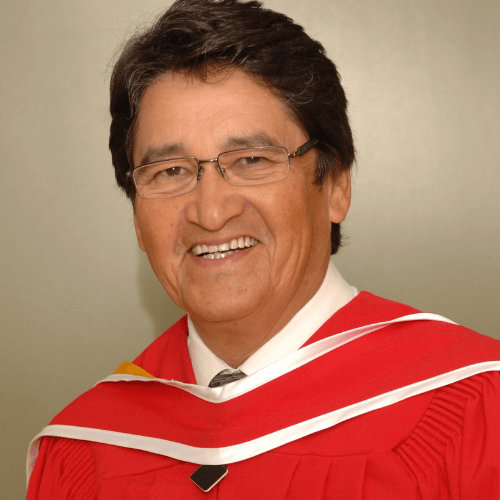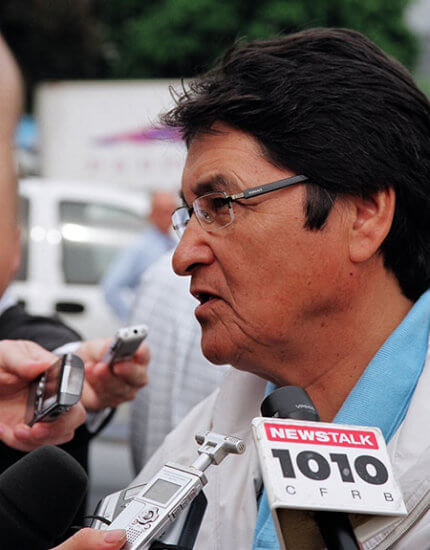‘Shift happening’ for Indigenous self-determination: Ovide Mercredi
Indigenous rights advocate speaks at Athabasca University’s Four Seasons Speaker Series
For Ovide Mercredi (Honorary Doctor of Letters ’09), Treaty was intended to be an opportunity for Indigenous Peoples and settler nations not just to coexist and merge, but to create a new society beyond what both Western and Indigenous idealism could fathom. The abandonment of this idea, he said, imposed an eternal conflict of interest that continues to influence Indigenous freedoms today.

“The federation disrupted our destiny,” said Mercredi, a Cree from Misipawistik Cree Nation. “The idea that we should hold discussions and come to an agreement … the federal government [found it] easier to use their police and army against Indigenous Peoples and that was a clear message to us.”
An advocate for Indigenous self-determination, self-definition, and constitutional reform and 2009 recipient of an Honorary Doctor of Laws from AU, Mercredi was a guest speaker at a recent talk hosted by Nukskahtowin (meeting place). The talk, part of AU’s Four Seasons Speakers Series, was facilitated by Priscilla Campeau, Nukskahtowin chair and program administrator, and Dr. Maria Campbell, AU’s Elder in Residence.
The conversation and series are part of the university’s commitment to conciliation and fostering dialogue on topics such as social justice, anti-racism, and Indigenous rights.
Treaties as a function of imposed government
Speaking from Grand Rapids, Man., Mercredi spoke about his idea of Indigenous self-determination. Answering questions from AU staff and students, he spoke about the destructive nature of the British North America Act, and the unkept promise of Section 35 of the Canada Act.
These acts were intended to protect traditional and hereditary forms of Indigenous government but were never adhered to—a legacy of broken promises, he said.
“Treaties are the basis Canada uses to claim dominion over all lands and resources. We have a different understanding of what Treaties represent in terms of the nature and scope of pre-existing rights.”
– Ovide Mercredi (Honorary Doctor of Letters '09)

“Our experience has been about intervention,” Mercredi said. “Intervention has created incredible damage to the capacity of the Nation to carry on as a collective. Treaties are the basis Canada uses to claim dominion over all lands and resources. We have a different understanding of what Treaties represent in terms of the nature and scope of pre-existing rights.”
Legacy of Charlottetown Accord
In 1991, Mercredi, then-National Chief, set out to help build the Charlottetown Accord—an effort to reform the constitution in recognition that Indigenous Peoples have the inherent right to govern themselves. The accord was defeated in a national referendum—an outcome all but guaranteed considering non-Indigenous populations in Canada outnumbered Indigenous Peoples 19 to 1.
“[It was] an example of how the power of population can be used to suppress Indigenous Peoples, preventing them from their vision, progress, and aspirations in this country,” Mercredi said. “We need [non-Indigenous people] to change society … to make sure their leaders and politicians make their laws comply with the rights of Indigenous Peoples.
“We’re not opposed to settlers coming—we’re not going to violate their individual and collective rights to co-exist—but we also want to share our development and progress on the same soil.”
How non-Indigenous allies can help
Asked how non-Indigenous people can be allies, Mercredi said that Indigenous Peoples do not require non-Indigenous allyship inside Indigenous communities. Even now, members of his own community are instituting their own laws on education without federal permission.
“[The settlers’] task is greater than mine,” Mercredi says. “Where I need your help is in your society, your own world. You must transform that country of yours. You will meet the same resistance we did; I can assure you that.
“You will be chastised by your own people for getting too involved in helping Indians, Métis, and the Inuit. The racism in your society is real, but you shouldn’t stop there. If you try, don’t do it by yourself—you’re not going to achieve anything alone. You must find like-minded people working together with contact to leaders within our Nations. You’re going to need that guidance.”
‘At what point do we stop trying to fit in?’
Noting that non-Indigenous allies with power and privilege can use their vote to help Indigenous communities, Mercredi pointed to 49 reserves north of Thunder Bay, where communities with upwards of 10,000 people don’t have access to hospitals.
“At what point do we stop trying to fit in when people don’t want us around? I see self-determination from Chiefs and Elders. I see in their hearts and minds not to put up with colonization anymore.”
– Ovide Mercredi
“How can my People survive with what we have?” Mercredi asked. “At what point do we stop trying to fit in when people don’t want us around? I see self-determination from Chiefs and Elders. I see in their hearts and minds not to put up with colonization anymore.
“There is a shift happening. It is up to Indigenous People to make sure we nurture that shift and we don’t allow the country to derail it with their policies, laws, and money.”
Banner image: Mathieu Côté, CC BY-SA 4.0, via Wikimedia Commons